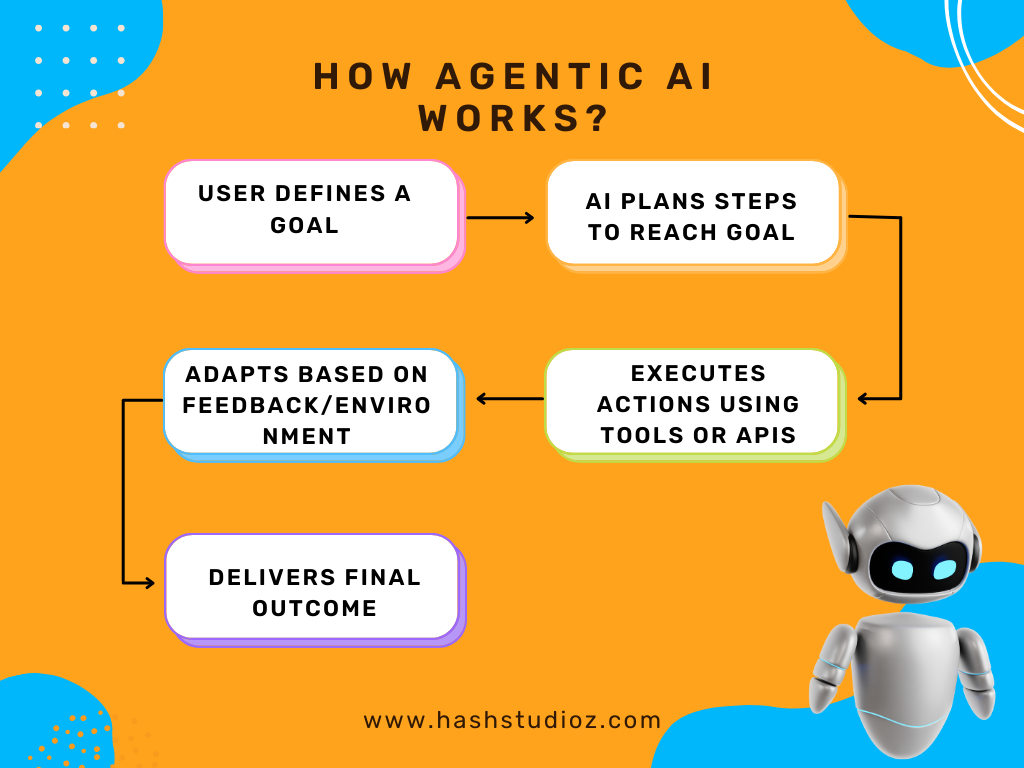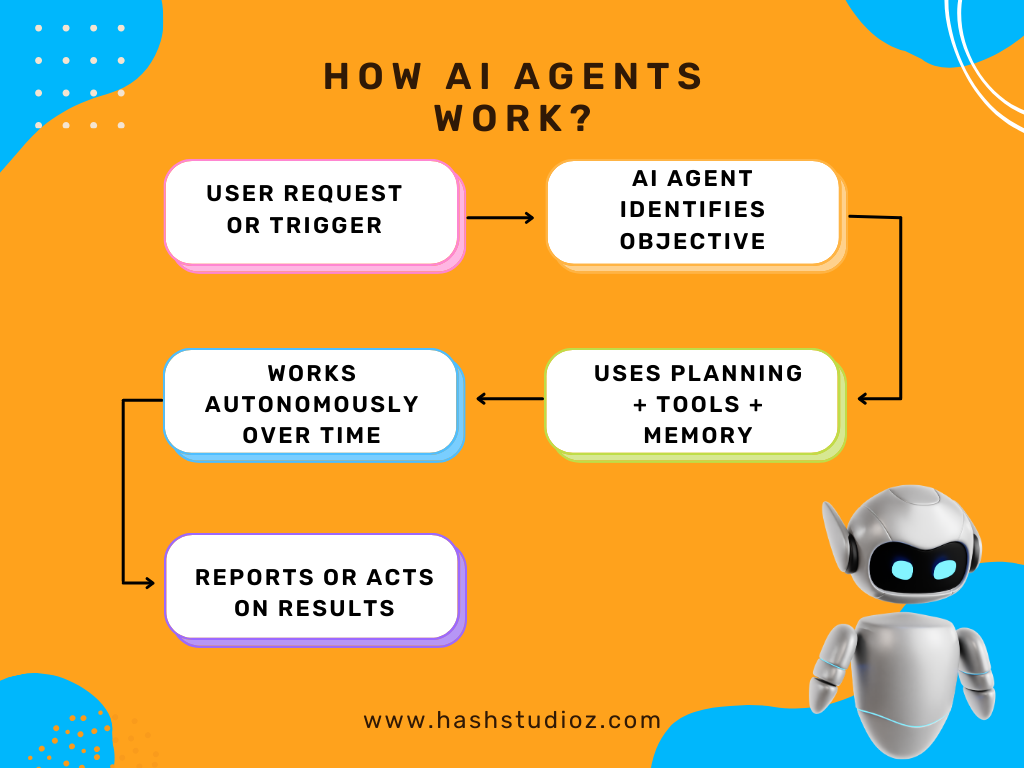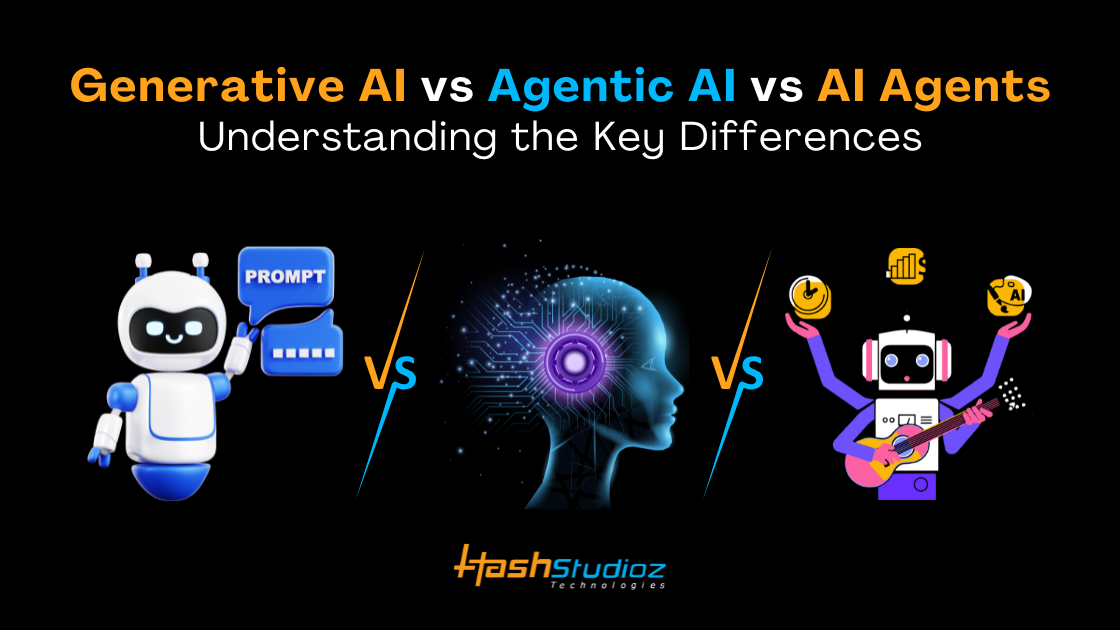Artificial Intelligence is always a trending topic but in recent times this landscape has been evolving at lightning speed. From language models that write human-like text to autonomous agents capable of taking complex actions, the spectrum of artificial intelligence has become more layered and nuanced than ever before. Among the most talked-about terms in this evolving field are Generative AI, Agentic AI, and AI Agents.
While they often overlap in discussions, each represents a distinct paradigm in the AI world. At HashStudioz Technologies, where innovation meets implementation, we believe it’s critical to distinguish these technologies, especially for businesses looking to leverage AI effectively.
Table of Contents
What is Generative AI?
Generative AI refers to AI systems that can generate new content whether it’s text, images, music, code, or even videos based on the data they’ve been trained on. These models understand patterns in massive datasets and use that knowledge to generate novel outputs.
Gen AI relies on using machine learning models called deep learning model algorithms that simulate the learning and decision-making processes of the human brain.

Core Capabilities:
- Text generation (e.g., ChatGPT, Bard)
- Image synthesis (e.g., DALL·E, Midjourney)
- Code generation (e.g., GitHub Copilot)
- Audio/music creation (e.g., Jukebox)
Common Use Cases:
- Content writing & marketing
- Product design & prototyping
- Conversational AI
- Virtual assistants
- Research paper drafting
Limitations:
- Lacks autonomy it needs prompts or instructions.
- One Shot Intraction.
- Doesn’t have goals, memory, or long-term planning capabilities.
What is Agentic AI?
Agentic AI takes things a step further. These systems are designed to autonomously make decisions, set goals, plan actions, and execute tasks all with limited human supervision. It combines the adaptability of large language models (LLMs) with the precision of traditional programming.
In other words, Agentic AI embodies autonomy and intentionality. It can reason, learn from feedback, and take independent steps toward achieving an objective. While generative AI might provide an answer, Agentic AI will figure out the problem, plan the steps, and solve it.

Core Features:
- Decision Making
- Tool usage (e.g., browsing the web, querying APIs)
- Memory and context awareness
- Dynamic decision-making and feedback loops
- Interactivity
Real-world Examples:
- AutoGPT: Executes a series of tasks with minimal input.
- Devin by Cognition: An AI software engineer capable of coding, debugging, and deploying software.
- BabyAGI: Task management through autonomous planning and execution.
What are AI Agents?
AI Agents are systems or programs that perceive their environment, make decisions, and act upon them to achieve specific goals. These agents may or may not use generative models or exhibit full autonomy like Agentic AI.

Think of them as software entities built around a sense-think-act loop:
- Sense: Gather data from sensors, databases, or user input.
- Think: Process data, reason over it, and make a decision.
- Act: Perform an action, send a message, trigger a process, etc.
Types of AI Agents:
- Reactive agents: Respond to stimuli without planning.
- Deliberative agents: Plan actions based on internal models.
- Hybrid agents: Combine both reactive and planning capabilities.
Common Use Cases:
- Chatbots and voice assistants
- Industrial automation agents
- RPA bots
- Smart home systems
Flexibility:
- May use rule-based logic, ML models, or even integrate LLMs.
- Can be part of an agentic system or work independently in narrow contexts.
Key Differences at a Glance
| Feature | Generative AI | Agentic AI | AI Agents |
|---|---|---|---|
| Primary Function | Content generation | Autonomous goal execution | Decision-making & task execution |
| Autonomy | Low to Moderate | High | Varies |
| Uses LLMs? | Always | Often | Sometimes |
| Goal-oriented? | No | Yes | Depends on design |
| Memory/Planning | Limited | Extensive | Basic to advanced |
| Tool Use | Rare | Essential | Possible |
| Examples | ChatGPT, DALL·E | Devin, AutoGPT | Alexa, RPA bots, smart agents |
Overlap & Intersections
The boundaries between these AI paradigms are fluid:
- Agentic AI systems often incorporate Generative AI models for tasks like writing emails or generating code.
- AI Agents can be built on top of Generative AI platforms to enhance interactivity.
- Hybrid architectures are becoming more common, where multiple agents collaborate some generative, some agentic.
Which One is Right for Your Business?
Choosing the right AI approach depends on your goals and complexity:
- Need content automation? → Use Generative AI tools.
- Need intelligent task automation? → Implement AI Agents.
- Need autonomous systems that plan, act, and improve? → Embrace Agentic AI.
HashStudioz Technologies specializes in designing custom AI solutions tailored to your needs whether that means training LLMs, building multi-agent systems, or integrating agentic intelligence into enterprise workflows.
Conclusion: A New Era of Intelligent Systems
As businesses move beyond basic automation, Agentic AI and advanced AI Agents are shaping a future where systems are not only smart but also self-directed. And while Generative AI was the catalyst, the next wave of innovation lies in autonomous, multi-step AI systems that can think and act on our behalf.
At HashStudioz Technologies, we help organizations navigate this transition by building future-ready AI solutions from generative chatbots to agentic platforms with memory, learning, and decision-making power.
Ready to explore AI for your business?
Let’s build custom AI agents that drive productivity, efficiency, and innovation.
📩 Contact us today for a free consultation!

